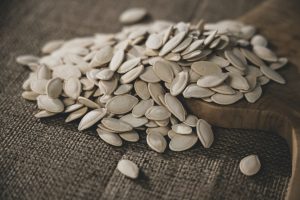 A great superfood with lots of benefits comes from a pumpkin. While meat is normally used for food and has many wonderful qualities and benefits, pumpkin seeds are the real hero that often isn’t recognized. If you call pumpkin seeds pepitas, you have good company, but you’d also be wrong. All pepitas are pumpkin seeds, but not all pumpkin seeds are pepitas. Pepitas don’t have the same color or the hard shell and the pumpkins they come from look extremely different from the traditional big orange pumpkins. However, many of the pumpkin seeds you purchase at the store are indeed pepitas.
A great superfood with lots of benefits comes from a pumpkin. While meat is normally used for food and has many wonderful qualities and benefits, pumpkin seeds are the real hero that often isn’t recognized. If you call pumpkin seeds pepitas, you have good company, but you’d also be wrong. All pepitas are pumpkin seeds, but not all pumpkin seeds are pepitas. Pepitas don’t have the same color or the hard shell and the pumpkins they come from look extremely different from the traditional big orange pumpkins. However, many of the pumpkin seeds you purchase at the store are indeed pepitas.
Pumpkin seeds are packed with nutrition.
These are seeds, which means there’s a great amount of nutrition available to nourish the new pumpkin plant. They’ll nourish you, too. Whether you’re eating home-roasted pumpkin seeds or green pepitas from the store, they all have healthy protein and fat, like omega3 fatty acids. Vitamin K, manganese, phosphorus, magnesium, iron, zinc and copper are also present in pumpkin seeds. They also have a lot of antioxidants, some potassium, B2, folate and fiber. They also contain phytonutrients, which can improve your overall health in many ways.
Eat pumpkin seeds to lower your risk of cancer.
If you eat pumpkin seeds regularly, there’s a good chance you’ll reduce the risk of breast, lung, stomach, colon and prostate cancer. They also help relieve the symptoms of BPH—benign prostatic hyperplasia. That causes an enlarged prostate gland and interferes with urination. Studies show that when people with BPH ate pumpkin seeds, it reduced the symptoms. Overactive bladders can benefit from eating pumpkin seeds too.
Early research indicates that pumpkin seeds may lower blood sugar levels.
Most studies so far have shown that pumpkin seeds, pumpkin, or pumpkin juice can help reduce blood sugar levels. However, they’re mostly animal studies. Human studies on people with type 2 diabetes found that taking a supplement of pumpkin powder or pumpkin juice could reduce blood sugar levels. It may be due to the magnesium levels in pumpkin seeds, since large observational studies show a diet higher in magnesium had a 33-34% lower risk of type 2 diabetes.
- Pumpkin seeds might improve heart health. Antioxidants, magnesium, fatty acids and zinc are important for a healthy heart and pumpkin seeds contain all of those. The oil may reduce blood pressure and cholesterol levels, while increasing nitric oxide levels.
- The zinc in pumpkin seeds may help improve sperm quality. It’s known that low levels of zinc are linked to increased infertility in men. Pumpkin seeds also contain antioxidants that may boost testosterone levels.
- Pumpkin seeds contain tryptophan, which is associated with a good night’s sleep. They also contain zinc that’s necessary for converting that tryptophan to serotonin, which then becomes melatonin, a sleep regulating hormone.
- You don’t have to spend a lot of money or opt for exotic dishes to add pumpkin seeds to your diet. Add them to a smoothie, toss on a salad or eat them for a snack. Seeds from winter squash also have many of the same benefits.
For more information, contact us today at Wellness On A Dime Coaching
